For the zero-waste system to make the greatest impact, it needs to work for everyone—on scales both large and small. Unfortunately, it’s often perceived as a lifestyle choice for those who have the time and money to invest in the right habits and products.
The reality is there are communities of all sizes and economic profiles around the world that have adopted zero-waste approaches in the fight against climate change.
From rural villages to entire countries, each has its own motivations and unique solutions to zero waste —illustrating the fact that there is no one-size-fits-all answer to sustainability, and anyone can work to improve waste disposal and conserve natural resources while simultaneously reduce greenhouse gas emissions.
So, from New York to New Delhi, from the Baltic Sea to Boulder County, here, we look at the progress of diverse communities around the world that prove how the zero-waste movement is making waves in so many places.
Zero-Waste Communities in Asia
Kamikatsu, Japan
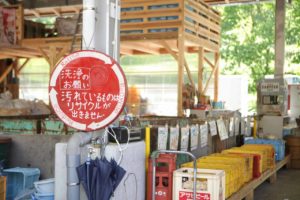
Source: nippon.com
Perhaps one of the most well-known zero-waste communities outside of the United States, the village of Kamikatsu made a zero-waste declaration back in 2003 and never looked back.
Behind the US, Japan is the second-largest producer of plastic in the world and incinerates 78% of solid waste (including some recyclables). However, this remote village has managed to buck the trend and recycle, compost, or reuse more than 80% of its waste through a truly comprehensive zero-waste program.
Residents famously sort garbage into 45 different types, pulling apart items made from multiple materials and washing everything before sending it to a central recycling station. The community also focuses on reducing waste through initiatives like distributing cloth diapers to new parents and a “swap-shop” where residents can leave unneeded items for others to take for free.
Taiwan

Source: ketagalanmedia.com
The Taiwanese waste plan has achieved what sounds miraculous for an entire country—a 99% landfill diversion rate. Digging a little deeper, the reality is that around 40% of that waste is currently incinerated.
However, this is still a significant improvement from 2003 when the Taiwan Environmental Protection Agency was pushed to adopt a zero-waste policy by concerned citizens who had won the battle against the construction of more incinerator facilities to tackle the country’s mounting waste problem.
Since then, recycling rates have risen from a mere 18% to over 50%, and the country has made progress in overall waste reduction through proactive prevention, such as reducing single-use plastics and disposable chopsticks. They also send around 75% of food waste to farms for animal feed and compost much of the rest. Not bad for a country with a population of 24 million people.
While incineration doesn’t meet the Zero Waste International Alliance’s definition of zero waste, the limited space on many islands results in unique waste management issues that require fundamental structural changes to solve. This means that island nations like Taiwan and Japan have the potential to someday become major innovators in the zero-waste movement.
Zero-Waste Communities in North America
Vancouver, Canada
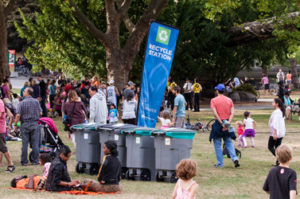
Source: vancouver.ca
The Metro Vancouver federation pledged to go zero waste in 2006, and between then and 2018 successfully reduced the amount of waste that was landfilled or incinerated by over 32%.
In 2018 the city went a step further by introducing Zero Waste 2040, a comprehensive long-term strategy to push Vancouver towards zero waste to landfill within the next twenty years.
This ambitious plan goes beyond simple waste management, fostering a culture of zero waste through system-wide change encouraging waste prevention through an operational model within the local government that can be replicated by other organizations.
Metro Vancouver also helped found Canada’s National Zero Waste Council, which hopes to support the transition to a circular economy through collaborations that promote sustainable designs and behaviors.
San Francisco, United States
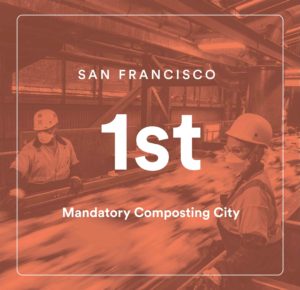
Source: politico.com
In 2003 San Francisco pledged to achieve zero waste by 2020 but found it an impossible goal to reach that quickly. The city is still a global leader in waste management, having implemented aggressive strategies to minimize trash and increase recycling through technological innovation, behavioral modification, and legislature.
It was the first city in the US to make composting mandatory while also banning non-recyclable, non-compostable single-use containers for foodservice back in 2007. Simplified waste separation and more robust recycling systems are also helping citizens work towards the goal of zero waste.
These programs have earned the city a landfill diversion rate of around 80%, which is hugely impressive and among the best in the world. However, what has become clear in the city’s efforts to reduce waste is certain items simply cannot be recycled—highlighting the importance of extended producer responsibility.
Zero-Waste Communities in Europe
Flanders, Belgium
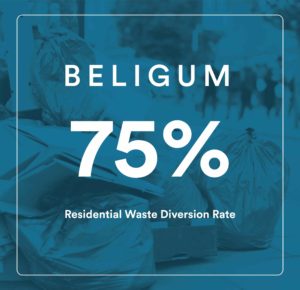
Europe’s greatest zero-waste success story can be found in this Flemish region of Belgium, which has been setting waste reduction and composting goals since the early 1980s. As of 2000 they had already achieved a 60% recycling rate, and today they currently divert around 75% of residential waste from landfill.
One unique aspect of Flanders is that overall waste generation has held steady since 2000 despite population growth, making it a rare example of how economic growth doesn’t necessarily lead to more waste.
The region has over 60 facilities to process organic and food waste, provides subsidies to second-hand shops, and has made it mandatory for producers, importers, and retailers to take back and properly dispose of hard-to-recycle items like electronic equipment, oils, and medicines. Their efforts are also boosted by Belgium’s progressive policies for resource management and sustainable production.
Cappanori, Italy
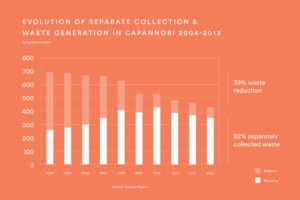
Even though this central Italian town was the first to make a zero-waste declaration in Europe, its story begins 10 years earlier when schoolteacher Rossano Ercolini teamed up with zero-waste expert Dr. Paul Connett to encourage residents to protest against the construction of an incinerator planned by the city council.
With their movement successful, Ercolini realized he needed to provide an alternative, and launched a door-to-door waste pick-up scheme. By 2010, 82% of municipal waste was successfully diverted from landfill, an introduction of scannable microchips on garbage bags, and a “Pay-As-You-Throw” fee later pushed that rate up to 90%.
Additionally, the municipality worked hard to reduce waste generation, such as restoring public water springs to discourage using bottled water and offering subsidized washable diapers to new parents. Cappanori is also home to Europe’s first zero-waste research center, which has worked with major coffee manufacturers to redesign disposable coffee pods.
More Zero Waste Communities Around the World
Buenos Aires, Argentina
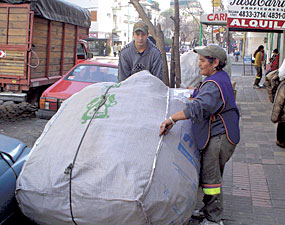
Source: no-burn.org
The zero-waste movement in Argentina’s capital is a truly grassroots effort. For decades, waste pickers called cartoneros have sorted valuable recyclables out of trash, diverting them from landfill to sell for profit.
In 2005, through the participation of community groups, Buenos Aires enacted a zero-waste law that set goals for 75% diversion from landfill by 2017, and a complete ban on landfilling recyclables and organic waste by 2020, as well as prohibiting incineration of urban waste.
Yet just three years later, it was clear that the law was not being implemented properly, and in 2018 it underwent a reform that removed the incineration prohibition. Despite these setbacks, both nonprofits and ordinary citizens continue to push the government for an improved zero-waste strategy, and together with the cartoneros, are doing their best to prevent valuable resources from ending up in landfill.
Thiruvananthapuram, India
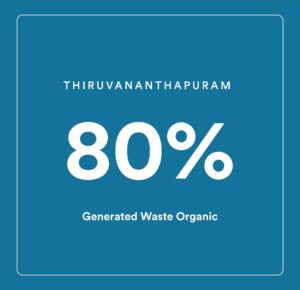
Like many developing countries, India struggles with waste management and Thiruvananthapuram is no exception. After its only municipal landfill was shut down due to mismanagement in 2011, the Kerala state capital needed to find a solution for its waste—fast.
The municipal government launched a decentralized system designed to process waste close to the site of generation and includes segregated waste collection, composting, and resource recovery.
Over 80% of waste generated is organic, and the city subsidizes residential composting, biodigesters, and biomethanation facilities as well as providing municipal composting facilities where households can bring their organic waste. The city also banned single-use plastics at public events and festivals, one of the most ambitious bans in India.
Online Zero-Waste Communities

Source: zerowastechef.com.com
For anyone interested in zero waste but who does not necessarily live in cities or regions with official zero-waste strategies, online communities are essential platforms that allowing the sharing of information and motivation in the quest to live more sustainably.
One of the biggest online zero-waste communities is Reddit’s r/ZeroWaste, which connects over 400,000 people from around the globe interested in trading tips and asking for advice on everything from avoiding plastic bags to reusing hard-to-recycle materials.
Another big zero-waste community that focuses on the kitchen was started by Anne-Marie Bonneau, also known as the Zero Waste Chef. Along with her blog, she runs an Instagram feed with a highly-active group of followers who discuss ideas of how to live more sustainably at home.
There are also countless smaller zero-waste communities online that focus on regional areas, from Australia to Zurich, or hobbies and lifestyles, like zero waste for pet owners or parents. Many of these can be found with a quick search online and show how the zero-waste movement has not only inspired people around the world but how it’s possible to strive towards a zero-waste lifestyle no matter who you are or where you live.
Whether online or off, communities are at the center of the zero-waste movement, and connecting and cooperating with other zero-waste proponents is one of the best ways to make real progress towards a more sustainable future.
For more information on zero waste and ideas on incorporating zero-waste principles into your own community, subscribe to zerowaste.com or follow the Zero Waste Blog.
No matter how large or small your business or family is, zero waste is not an impossible goal. For more ideas on what you can do to further your own journey, check out our guide on zero waste at home. Additionally, if your business is looking to go zero waste, contact one of our TRUE Advisors today to discuss your current waste management systems and what we can do to help!

